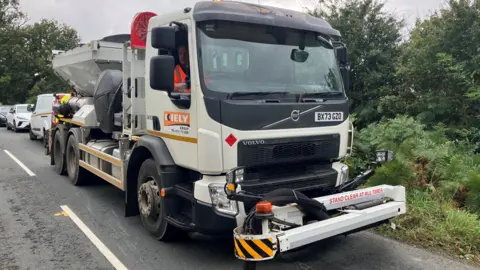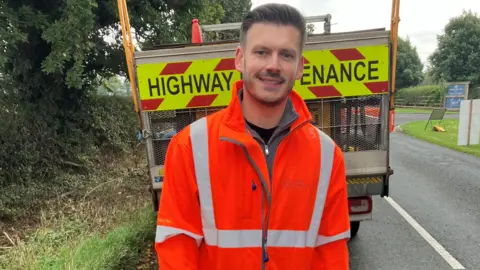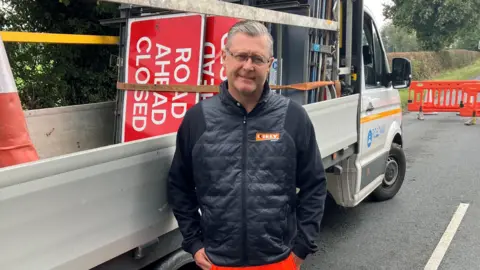'Lightning-fast' pothole filler put to the test
 BBC/ Ian Reeve
BBC/ Ian ReeveNorth Yorkshire Council has added a "lightning-fast" machine to its arsenal as it tackles the region's potholes.
The £500,000 piece of kit from Australia took to the roads around Flaxton and Norton on Tuesday as part of a council trial.
The "micro-asphalt surface treatment" sees chippings sprayed into a pothole before the road is compacted, levelled and sealed with an emulsion - all controlled by the vehicle's driver.
"They don't even have to leave the cab," said Keane Duncan, the council's executive member for highways and transportation.
Duncan said: "It's much quicker, it's lightning fast.
"A job that would usually take about 24 minutes takes just three and it is also significantly cheaper, less than half the cost of the usual repair."
 BBC/ Ian Reeve
BBC/ Ian ReeveWith a budget of about £55m a year, the council sought out its own pothole filler.
"It's £500,000, it's an expensive piece of machinery, but it has been so effective," Duncan added.
A cheaper form of road resurfacing has also been introduced in the county.
The spreading of a slurry rather than stones and bitumen meant the road did not have to be dug up.
Speaking in Millside in Norton, Neil Levett from specialists Kiely Bros said: "By the low-cost investment in the road the council are making, they're preserving the lifespan of this road by another 10 to 12 years."
 BBC/ Ian Reeve
BBC/ Ian ReeveAccording to the Asphalt Industry Alliance, it is thought about £16bn would be needed to clear a pothole repair backlog in England and Wales.
The AA said it dealt with 631,852 pothole-related incidents related to tyres, wheels, steering and suspension last year.
With an average repair cost from a pothole incident being £250, the AA estimated they had cost its customers about £160m in total last year.
The organisation believed the total figure for the entire country could be as high as £500m, as it only represented around a third of Britain's drivers.
Listen to highlights from North Yorkshire on BBC Sounds, catch up with the latest episode of Look North or tell us a story you think we should be covering here.
